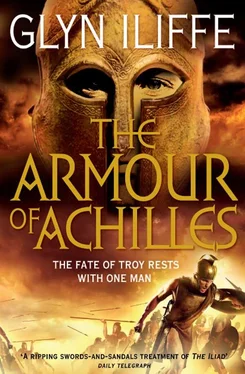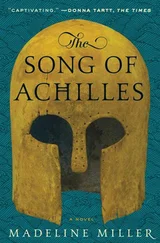Glyn Iliffe - The Armour of Achilles
Здесь есть возможность читать онлайн «Glyn Iliffe - The Armour of Achilles» весь текст электронной книги совершенно бесплатно (целиком полную версию без сокращений). В некоторых случаях можно слушать аудио, скачать через торрент в формате fb2 и присутствует краткое содержание. Год выпуска: 0101, ISBN: 0101, Издательство: Pan Books, Жанр: Старинная литература, на английском языке. Описание произведения, (предисловие) а так же отзывы посетителей доступны на портале библиотеки ЛибКат.
- Название:The Armour of Achilles
- Автор:
- Издательство:Pan Books
- Жанр:
- Год:0101
- ISBN:9781447205098
- Рейтинг книги:4 / 5. Голосов: 1
-
Избранное:Добавить в избранное
- Отзывы:
-
Ваша оценка:
- 80
- 1
- 2
- 3
- 4
- 5
The Armour of Achilles: краткое содержание, описание и аннотация
Предлагаем к чтению аннотацию, описание, краткое содержание или предисловие (зависит от того, что написал сам автор книги «The Armour of Achilles»). Если вы не нашли необходимую информацию о книге — напишите в комментариях, мы постараемся отыскать её.
The Armour of Achilles — читать онлайн бесплатно полную книгу (весь текст) целиком
Ниже представлен текст книги, разбитый по страницам. Система сохранения места последней прочитанной страницы, позволяет с удобством читать онлайн бесплатно книгу «The Armour of Achilles», без необходимости каждый раз заново искать на чём Вы остановились. Поставьте закладку, и сможете в любой момент перейти на страницу, на которой закончили чтение.
Интервал:
Закладка:
Odysseus strode into the middle of the debate and snatched the staff from Menelaus’s grip. He raised his hands for calm and waited for Teucer and Menelaus to move aside before turning to the King of Men, seated in his golden throne.
‘What should you care, my lord, if Ajax killed a hundred or even two hundred beasts?’ he asked in a soft voice. ‘Ten times that number and more have been sacrificed in thanks for the victories Ajax has brought us over the years. And do you think he’d have carried out such an act if the gods hadn’t first robbed him of his senses?’
Despite their surprise that Odysseus had spoken in defence of Ajax, there were a few consenting grunts from the circle of onlookers and a firm nod of agreement from Diomedes. But not all were so quickly persuaded.
‘If the gods turned his mind, then he brought it on himself,’ Nestor contended. ‘He always claimed the glory for his own deeds and never gave the gods their dues. He was asking for trouble.’
‘No suicide deserves proper funeral rites!’ Little Ajax added, stepping forward. ‘Feed his body to the fish!’
His single eyebrow was contorted with anger and his fists were clenched, but beneath his fury Eperitus could see that he was hurt. His namesake’s act of self-destruction had been a betrayal that the Locrian was struggling to understand. When Odysseus turned his piercing green eyes on him, though, his head dropped and he retreated back into the crowd.
‘A suicide cursed by the gods,’ Odysseus said. ‘Maybe so, but there was another factor in Ajax’s death – the part played by me. If I hadn’t been awarded Achilles’s armour he would be alive now, and so would your precious livestock.’
‘Are you blaming me?’ Agamemnon asked, lifting his chin a little from his fist.
‘I blame myself , Agamemnon, although I was just an instrument in the revenge of the Olympians. My victory – or the dishonour of his own defeat – was too much for Ajax’s proud mind to bear. For that reason I beg you, my lord, to employ the greatest power available to any king – the power of mercy. Forget the errors of Ajax’s sickness and remember how he always fought in the forefront of every battle, killing many of Troy’s greatest men. He was the stalwart of the Greek army, a man that even Hector could not defeat. Indeed, it seems the only man capable of defeating Ajax was Ajax himself! So I ask you to permit Teucer to cremate his half-brother with full funeral rites, which he earned in life by his deeds as a warrior. And if Teucer will forgive me , then I would ask him to accept my help in performing the rites.’
There was a murmur of approval and Diomedes demanded that he, also, should be permitted to help. But Agamemnon did not reply at once. He rested his chin back on his fist and stared at Odysseus with a cold, unwavering gaze, taking his time to weigh the arguments as well as to remind the council that he was their leader and all decisions lay ultimately with him. Then he sat up and leaned back with a sigh.
‘I will not throw Ajax’s body to the fish, as some have demanded,’ he began, looking at Menelaus and Little Ajax. A few among the council voiced their relief and pleasure, and even Eperitus felt an unexpected flush of gratitude towards the King of Men, whom he normally loathed. Then Agamemnon held his hand up for silence and they realized their relief had been premature. ‘But neither will he receive the full rites due to a great warrior. Ajax took his own life and as such will be allowed a simple burial without honour. Teucer, you have my permission to bury him wherever you choose, as long as it is beyond the walls of this camp.’
And so it was, in spite of all the Trojans he had slain and all the battles he had turned in favour of the Greeks, that Ajax’s giant corpse was placed in a lonely suicide’s grave on a cliff top overlooking the sea. He was not given a period of mourning or a warrior’s cremation, and there were no games in his memory. The only song raised over his body was the wailing of Tecmessa, competing with the howls of the wind and the crashing of the waves below. Eurysaces sat beside her, clutching his mother’s black dress as he watched Teucer, Odysseus, Diomedes and Eperitus lower the shrouded body of his father into the pit they had dug. Then each man cut off a lock of his own hair and threw it into the grave, before refilling it with earth. Halfway through, Little Ajax appeared and stood beside them, honouring his friend with his tears as he hung his head and was silent. After a while Teucer put an arm about Tecmessa’s shoulder and led her, carrying Eurysaces, back towards the camp, followed at a distance by Little Ajax.
Once the last of the soil had been replaced, Odysseus and Eperitus returned to the beach where Arceisius’s funeral pyre was being prepared. While Odysseus carried out sacrifices and uttered prayers to the callous gods, Eperitus stood back and watched the sun draw gradually closer to the distant horizon. It was a scene he had observed countless times before, but today there was a finality about it, as if some prophetic instinct told him he would not see many more. Then the first pall of smoke twisted up from Arceis-ius’s funeral pyre, spreading a smear of imperfection across the cloudless sky. The smell of burning wood and roasted flesh accompanied it, giving an unpleasant tang to the otherwise clean air that blew in from the Aegean. And all the time the sea breeze filled his ears with the crash and tumble of the white-capped waves, silencing the usual noises of the camp beyond the beach so that the only other sound was the crackle of flames, snapping and popping delightfully as they hastened the destruction of Arceisius’s corpse.
A handful of other figures stood watching the pyre: Antiphus, his arms crossed and his eyes red with smoke and tears; Eurybates, busying himself by throwing an armful of faggots on to the fire; Polites, massive and silent, his giant hand resting on the shoulder of the fourth figure, the comparatively diminutive Omeros. In the few months since he had arrived on the shores of Ilium the young bard had shed his gentle layers of fat and had started to grow his hair long, like all the other soldiers in Agamemnon’s army. He had lost much of his naïvety, too, surviving the murderous press of the battle line and killing and maiming his share of Trojans in the process. And yet, while the Fates had spared Omeros, Arceisius – the shepherd boy whom Eperitus had transformed into a fearsome warrior – had joined the legions of the dead that the war had created. Such was the will of the gods.
Eperitus turned his eyes from the flames of Arceisius’s funeral pyre to where Odysseus was washing the sacrificial blood from his hands. After staring at the burning corpse for a few moments, the king walked to his hut and fetched Achilles’s armour, which he planted in the sand before sitting down with his arms folded across his knees. Eperitus joined him and they sat there in silence as the sun crept lower towards the horizon, Odysseus contemplating the patterns on the great, circular shield – as if the answer to all his worries and problems lay in the cyclical movements of the little figures – while Eperitus’s mind slipped into a trough of black thoughts about the death of Arceisius, Apheidas’s treachery and Astynome’s deceit.
After a while his eyes fell on the armour.
‘What will you do with it?’ he asked, his voice slightly croaky because he had not spoken for so long.
Odysseus shifted, wincing slightly as his muscles complained at the movement.
‘Such armour isn’t for me, Eperitus, and I’ve vowed never to wear it. But there’s something I didn’t tell you. Something that Athena revealed to me in my hut.’
Eperitus turned to him, his curiosity aroused.
Читать дальшеИнтервал:
Закладка:
Похожие книги на «The Armour of Achilles»
Представляем Вашему вниманию похожие книги на «The Armour of Achilles» списком для выбора. Мы отобрали схожую по названию и смыслу литературу в надежде предоставить читателям больше вариантов отыскать новые, интересные, ещё непрочитанные произведения.
Обсуждение, отзывы о книге «The Armour of Achilles» и просто собственные мнения читателей. Оставьте ваши комментарии, напишите, что Вы думаете о произведении, его смысле или главных героях. Укажите что конкретно понравилось, а что нет, и почему Вы так считаете.












